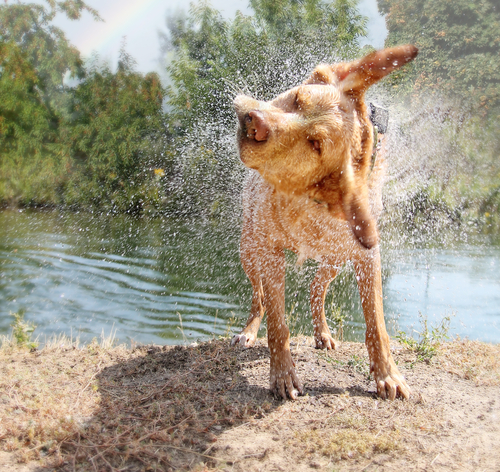
Summer 2020 was the season of the lockdown, so you want to make summer 2021 the season of fun. Whether you and your pet are hiking, camping, fishing, or relaxing by the lake, several things can pose a threat. Our team at Livermore Family Pet Hospital wants to ensure you can enjoy your summer by providing strategies to keep your pet safe from these dangers.
Protecting your pet on land
Warm weather is perfect for hiking on favorite trails and camping at preferred locations. Your pet does not want to miss out on the fun, but a few critters can cause serious issues for them if you’re not careful.
- Rattlesnakes — Rattlesnakes are the largest venomous snakes found in the United States. Avoiding contact with snakes is the best course of action. Keep your cat inside, and keep your dog on a leash. Also do not allow your dog to stick their head into heavy brush or rock crevices. If your pet is bitten by a rattlesnake, get them to a veterinarian as quickly as possible.
- Mosquitoes — Mosquitoes carry baby heartworms, called microfilariae, that they can transmit to your pet when they bite them. These parasites can grow to adulthood, mate, and produce offspring in your dog. They typically do not reach adulthood in felines, but they can still cause significant problems for your cat. Many pets do not show signs when they are first infected. As the disease progresses, signs can include coughing, fatigue, and weight loss. Some pets may collapse or die suddenly.
Blood tests are available to diagnose heartworm disease, but your cat may need an X-ray or ultrasound to confirm the diagnosis. Dogs can be treated for heartworm disease, but the medications can be dangerous for them. Unfortunately, no treatment has been approved for cats. Year-round prevention is the best way to address heartworms in cats and dogs—ask our team which product would best protect your pet.
- Ticks — Ticks can transmit several illnesses to your pet. These illnesses, including Lyme disease, anaplasmosis, and ehrlichiosis, can cause debilitating illness in your pet. Ticks typically need to stay attached to your pet for at least 24 hours before transmission can occur. Signs include fever, lethargy, joint pain and swelling, and decreased appetite. Tick-borne illnesses are usually responsive to a particular class of antibiotic, and your pet will typically need to be treated for several weeks. You can avoid these diseases by providing your pet year-round flea and tick prevention. You should also check your pet carefully any time they are outside, and remove any ticks you find.
Protecting your pet near water

Many pets love a good swim and enjoy time around natural water sources. Several things can cause problems for your pet in these conditions, however.
- Algal blooms — Blue-green algae are cyanobacteria that occur in non-flowing freshwater during hot weather, and can be deadly if your pet swims in or consumes them. Signs include drooling, diarrhea, vomiting, weakness, disorientation, respiratory distress, and seizures. If your pet is exposed, rinse them well and take them to a veterinary hospital immediately. Tips to avoid blue-green algae poisoning include:
-
- Keep your pet leashed at all times around bodies of water.
- Do not let your pet drink or swim in ponds or lakes.
- Recognize algal blooms when you see them. The blooms typically appear as a mat on the surface of the water, and can be blue, green, brown, or red. The toxic algae usually have a bad odor.
- Salmon poisoning — Dogs can die if they eat certain types of raw fish. Salmon and other species that swim upstream to breed can be infected with a parasite called Nanophyetus salmincola. If this parasite is infected with an organism called Neorickettsia helminthoeca, salmon poisoning disease results. Dogs and other canines are the only species susceptible to the disease. Common signs include vomiting, fever, diarrhea, lethargy, and swollen lymph nodes. If not treated promptly, dogs will usually die in 14 days or less. Treatment includes an antibiotic and a deworming medication, and your pet may also require intravenous fluids if they are dehydrated. When around water, ensure your dog does not ingest any raw fish, and if you take your dog fishing, secure your catches in an area that your dog cannot access.
- Fish hooks — Fish hooks pose a danger because they can become embedded in your pet’s skin and can be difficult to remove. Accidentally swallowing a fish hook can cause even bigger problems. For instance, if your pet eats a fish head that has a hook embedded, when the tissue is digested, the barbs on the hook will damage your pet’s gastrointestinal lining as they are passed. Your pet needs immediate veterinary attention if they swallow a fish hook. In addition, if a piece of the hook remains hanging out of their mouth, do not pull on it because this can worsen internal injuries.
If your pet has an unfortunate encounter this summer despite your best efforts, do not hesitate to contact our team at Livermore Family Pet Hospital.

